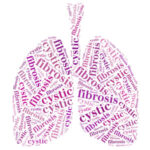 Can I get pregnant if I have CF?
Can I get pregnant if I have CF?
YES. Most women with CF can get pregnant and give birth to healthy babies, but it’s always best to PLAN AHEAD with the help of your partner, family and CF team! Girls with CF have the same female anatomy (ovaries, fallopian tubes, uterus, cervix, vulva and vagina) as girls without CF and usually have normal menstrual cycles. However, the mucus in and around your cervix may be thicker than in a woman without CF, which may make it slightly harder for sperm to reach an egg. It is still very important to use contraception (if you are having sex with men) unless you are ready to become pregnant.
Is pregnancy different when you have CF?
Pregnancy can have a big impact on your health, especially if you have CF. If you are healthy and have stable lung function, pregnancy is generally safe. However, if you are unwell or have poor lung function, pregnancy will put an additional strain on your body. Careful planning for pregnancy at a time when you are as healthy as possible can lead to the best outcomes for both you and your baby. There are many different options for becoming a parent aside from becoming pregnant and having a baby.
Can I have a healthy pregnancy?
Pregnancy does not affect the life span of women with CF. However, during pregnancy, many women experience more CF exacerbations. You may also experience constipation and issues with nutrition and gaining enough weight for your baby’s growth. Just like women without CF, you can also develop a form of diabetes called gestational diabetes during pregnancy that usually improves after the baby is born. Because of these health concerns, it is very important to work closely with your CF team and your obstetrician throughout your entire pregnancy.
Can I take my regular CF medications if I plan on becoming pregnant?
Some CF medications are dangerous for a developing fetus and can cause birth defects. That’s why it’s very important to tell your CF team when you are thinking about becoming pregnant. Your CF team will help you figure out any changes to your medications and therapies that may be required before you become pregnant. Your provider(s) will also likely have you take prenatal vitamins and folic acid before you try to become pregnant.
What if I’m having trouble getting pregnant?
Most women with CF are able to become pregnant. As stated above, some research shows that thicker cervical mucus and poor nutrition may make it harder to get pregnant. If you have stopped your birth control and have been trying to become pregnant without success, you can talk to your CF team about getting a referral to see a fertility specialist. Typically, fertility testing isn’t done until a couple has been trying to get pregnant for about a year.
What should I do if I think I am pregnant?
If you think you may be pregnant, the most important first step is to call your CF team. They can confirm pregnancy through a pregnancy test and help you figure out the best options based on your needs and your health. It’s important to know that you have many options.
Our health guides are developed through a systematic, rigorous process to ensure accuracy, reliability, and trustworthiness. Written and reviewed by experienced healthcare clinicians from Boston Children's Hospital, a Harvard Medical School teaching hospital and consistently ranked as a top hospital by Newsweek and U.S. News & World Report, these guides combine clinical expertise, specialized knowledge, and evidence-based medicine. We also incorporate research and best practices from authoritative sources such as the CDC, NIH, PubMed, top medical journals, and UpToDate.com. Clinical specialists and subject matter experts review and edit each guide, reinforcing our commitment to high-quality, factual, scientifically accurate health information for young people.